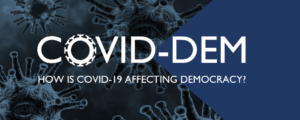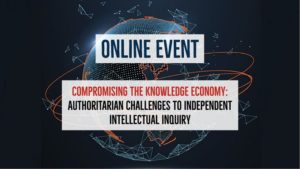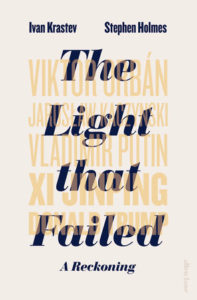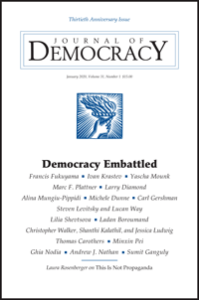 Coronavirus-related pressures are having a detrimental effect on democracies around the world, argues Steven Feldstein, a former U.S. deputy assistant secretary of state for democracy, human rights, and labor. “Pandemic-fueled leadership wobbles are widespread but especially serious in Brazil, Indonesia, and the Philippines,” he writes.
Coronavirus-related pressures are having a detrimental effect on democracies around the world, argues Steven Feldstein, a former U.S. deputy assistant secretary of state for democracy, human rights, and labor. “Pandemic-fueled leadership wobbles are widespread but especially serious in Brazil, Indonesia, and the Philippines,” he writes.
The worries don’t stop there: Bolivia, Lebanon, Kenya, and Nigeria are all faced with challenges that could decide their future democratic trajectory, Foreign Policy adds. Even as countries focus on their first priorities—defeating the coronavirus—upholding democracy is at risk of taking a back seat.
“If democratic backsliding intensifies, then we can add another casualty to the terrible toll already inflicted by the coronavirus: the demise of democracies that were too fragile to withstand the authoritarian inclinations of their leaders,” Feldstein writes.
The United States and other democracies need to make clear to abusive governments that using the pandemic to persecute political enemies is unacceptable, argue Freedom House president Michael J. Abramowitz, and David J. Kramer, the director of Florida International University’s European and Eurasian studies and senior fellow in the Vaclav Havel Program on Human Rights and Diplomacy.
 The choices made today will help shape the world that emerges from the pandemic, whose course has only underscored the dangers posed by governments that lack transparency and accountability to the public, they write. The United States and other democracies should:
The choices made today will help shape the world that emerges from the pandemic, whose course has only underscored the dangers posed by governments that lack transparency and accountability to the public, they write. The United States and other democracies should:
- Demand that journalists be allowed to do their jobs, and condemn attacks against them in any shape or form.
- Lift restrictions on freedom of assembly and travel as soon as public health allows. Until then, democracies should make travel exceptions for those who must flee their homeland to avoid persecution or death.
- Impose targeted Magnitsky Act sanctions on individual government officials who are responsible for egregious human rights violations.
- Press governments for the release of political prisoners, or where that fails, demand release through expedited court hearings, even if they must be held remotely, so that detainees are not left in dangerous conditions of confinement during the crisis.
- Urge protection for minority groups from scapegoating and physical attacks.
- Insist that increased surveillance and incursions on privacy be limited in time and scope and do not exceed what is strictly necessary to control the pandemic.
- Ensure that elections are held without unreasonable delay using safe alternative voting methods—for example voting by mail or casting ballots over a number of days to reduce crowding. Election observers should also be accommodated to ensure a free and fair process.
- Continue funding to support those working to protect freedom and human rights around the world. Thankfully, Congress and U.S. government agencies have already signaled that they intend to carry on with important democracy assistance programs.
 The widespread condemnation that followed the recent arrest of more than a dozen Hong Kong activists was a good model for international solidarity on democracy issues during the pandemic, Abramowitz and Kramer conclude. RTWT
The widespread condemnation that followed the recent arrest of more than a dozen Hong Kong activists was a good model for international solidarity on democracy issues during the pandemic, Abramowitz and Kramer conclude. RTWT
Join the Forum @ NED @ThinkDemocracy on May 11 for an online event with Glenn Tiffert and Carnegie’s Michele Dunne on “Compromising the Knowledge Economy: Authoritarian Challenges to Independent Intellectual Inquiry,” the latest in the Sharp Power and Democratic Resilience series, from the NED’s International Forum.
 Foreign Policy, in partnership with the Lionel Gelber Prize and the Munk School of Global Affairs & Public Policy at the University of Toronto, invites you to join a thought-provoking conversation with Ivan Krastev and Stephen Holmes, winners of the 2020 Lionel Gelber Prize for their book The Light That Failed: A Reckoning. This FP Virtual Dialogue examines the fate of Western democracy in light of how modern liberalism has failed to take root across former communist states.
Foreign Policy, in partnership with the Lionel Gelber Prize and the Munk School of Global Affairs & Public Policy at the University of Toronto, invites you to join a thought-provoking conversation with Ivan Krastev and Stephen Holmes, winners of the 2020 Lionel Gelber Prize for their book The Light That Failed: A Reckoning. This FP Virtual Dialogue examines the fate of Western democracy in light of how modern liberalism has failed to take root across former communist states.
Join an engaging discussion with Janice Stein, Lionel Gelber Prize Jury Chair, Cameron Abadi, Deputy Editor of Foreign Policy and 2020 Lionel Gelber Prize jury member, and authors of The Light That Failed: A Reckoning, Ivan Krastev – a contributor to the National Endowment for Democracy’s Journal of Democracy – and Stephen Holmes as they explore the post-Cold War repudiation of liberalism in Eastern European countries, where liberal principles may have gone off course, and how this informs the key political and social trends of our time.
 What can be done to save the fundamental values on which the West is built? And as crises and advanced technologies may usher in restrictive measures on civic and individual freedoms, what insights can we glean about the future of liberal democracy?
What can be done to save the fundamental values on which the West is built? And as crises and advanced technologies may usher in restrictive measures on civic and individual freedoms, what insights can we glean about the future of liberal democracy?
Join the conversation online by using the #FPDemocracyDialogue and #GelberPrize30
Event Details:
FP Virtual Dialogue
Is the West Losing the Fight for Democracy?
May 21, 2020
11:00 AM – 12:00 PM EDT







